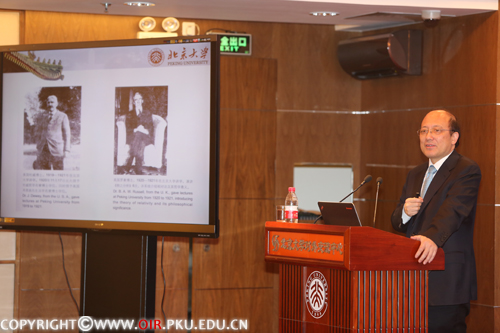From April 16th to 18th, the Brazil-China Scientific Symposium was successfully held at Yingjie Exchange Center of PKU. The symposium saw the attendance of over 50 scientific elites from Peking University, Tsinghua University, Fudan University, China Agricultural University, Chinese University of Hong Kong, Chinese Academy of Agricultural Sciences, University of Sao Paulo, Sao Paulo State University, and University of Campinas. The symposium, sponsored by both the São Paulo Research Foundation (FAPESP) and Peking University (PKU), mainly focused on expand the relationship between researchers from the state of São Paulo and researchers from several academic and research institutions in China, for the purpose of promoting joint studies that could benefit the people of both countries.

On April 16th, Professor Wang Enge, President of Peking University, attended the opening ceremony, together with Professor Celso Lafer, President of FAPESP, Valdemar Carneiro Leão, Brazilian Ambassador to China, and Fang Jun, Deputy Director General of Department of International Cooperation and Exchanges, Ministry of Education of China. Their speeches focused on the significant role of scientific researches in the ever-changing world today. They also touched on the brilliant prospect of scientific collaboration between the two countries. Both Professor Wang Enge and Professor Celso Lafer expressed their conviction that in such a symposium, where ideas have the opportunity to clash and ignite, it would further expand understanding among these outstanding researchers, deepening international research cooperation.
The symposium consisted of several parallel sessions, and the topics ranging from materials, nano-technology, and medical to life sciences. In each session, the researchers delivered speeches on their latest study, and participated in discussions with other attendees subsequently.

Business and Agriculture
Professor Paulo Araújo, from the Luiz de Queiroz Agricultural College in Brazil, led the discussion session in the field of agricultural and applied economics. His sharing started with a short summary of the Brazilian economy, in particular the increasingly developing models of agribusiness in Brazil.
During the session, comments were made on the investments of human capital and the development theory, including that of the Solow model. Several examples of technological changes in agriculture, and estimates of TFP and social returns to agricultural research and extensions were also raised. Professor Paulo Araújo stressed the importance of the coordination of capital and agriculture, which can make the agricultural production more efficient.
The session closed with ending remarks that focused on the development of future projects, and mutual benefits concerning technology and agricultural economy.

Water sources in Forest requires attention
Mountainous areas are important for both forestry and providing water supply to dry landlocked regions that have a high erosion risk and water shortage. Large-scale afforestation designed mainly for erosion control was implemented during the last decade in arid regions of north and northwestern China. But dense forests may result in negative impacts on the water and natural regeneration due to a strict logging ban policy.
Under this background, Professor Wang Yanhui and his group managed to develop a practical approach for multifunctional forest (MFF) management, with the water aspect taken into consideration. They integrated existing knowledge and experiences and conceived an “ideal” MFF structure and its key parameters.
Moreover, a decision-making process for management planning was recommended through the following 5 steps:
1) Investigating the site’s quality
2) Identifying the site-specific main forest functions
3) Quantifying the structure
4) Diagnosing the structure by comparing with the “ideal” one
5) Arranging the functions/structure-oriented management measures
In this way, as they presented, water supply and forest development can be balanced in the process of creating a harmonious environment.

Plants: play a key role in climate changes
The requirement for food and renewable energy production on the planet will demand a massive increase in plant biomass by 2040. From this perspective, understanding how plants function will be essential for designing future strategies of plant bioengineering in the future scenario of climatic changes.
For many years, Professor Marcos Buckeridge has been working on how to integrate the knowledge of physical, molecular and biochemical features of plants to explain their behaviors. In addition, his group studied the integrative responses of crop species to the elevation of atmospheric carbon dioxide, temperature and drought, which is helpful to forecast plant behavior under changing environmental conditions.
In his presentation, he used sugarcane as a case study, showing results on the whole plant physiology-metabolism-transcription integration under environmental stresses such as elevated carbon dioxide level and drought.
The Brazil-China scientific symposium is the first event that FAPESP chose to hold in China. At the end of the symposium, there is a consolidated consensus that it was a grand meeting for minds. It is expected that the spirit of exploring, individual thinking and objective commenting exhibited in the symposium will spread to other areas of cooperation between the two countries, and leads us to a brighter future.
Written By: Yuan Yating



